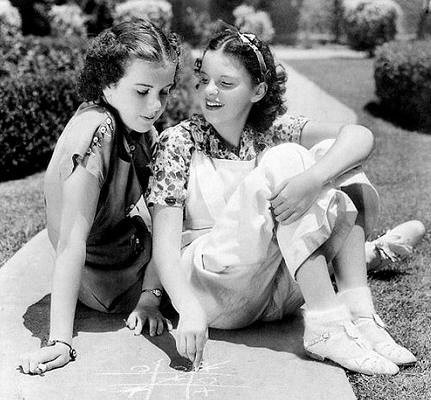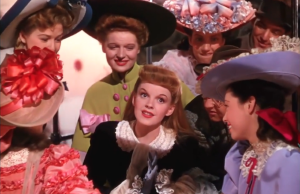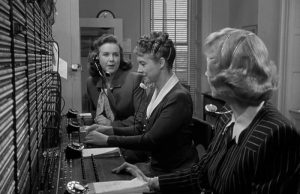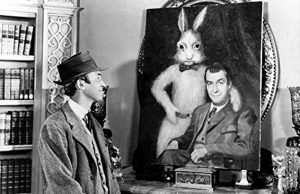The Career of Deanna Durbin

It’s a well-publicized fact (not least by the lady herself) that Mae West’s films saved Paramount from financial disaster in the early 30’s. But regardless of her boxoffice importance, Paramount still had Lubitsch, Mamoulian, von Sternberg, DeMille, The Marx Brothers, Fields, Crosby, Dietrich, Cooper, Colbert, Chevalier and sundry other major names to help sustain their status and prestige, if not always their solvency.
Deanna Durbin must be unique in film history as being the only star to save her studio’s bacon financially and enable it to remain at least nominally a major power. And she did it single-handedly starting at age 15!
When Deanna joined Universal in ’36, the Laemmle regime had just been eased out–and with it the policy of creative, mature, often literary films. Of all the big directors who had worked at Universal in the early 30’s–Milestone, Ford, Stahl, Browning, Cruze, Freund, Garnett, Wyler, Wale–only Whale was still under contract, and his powers and freedom much curtailed. Universal had one major problem in that they owned no theatres and thus couldn’t guarantee exhibition for their product. Their best films had to compete on the open market with the best films of major companies that did own theatres and naturally gave foavored playing time to their own product. And their weaker films couldn’t be ssalvaged by sheer volume of bookings or astute double-billing.
The new regime at Universal knew little about making movies, but thought they knew a lot about business. The first move was to cut out all “big” pictures and all “unconventional” pictures, big or small. And in line with the Production Code–dictated trend to “family” entertainment what was made was innocuous in the extreme, guaranteed to offend nobody. The gutsy old horror films of Karloff and Lugosi were gone; even the vigorous and somewhat austere Buck Jones Westerns were replaced by the slicker, slower musical Westerns with Bob Baker.
In ’37, the year of Deanna Durbin’s One Hundred Men and a Girl, the studio’s only other “A” film was the interesting but badly sabotaged The Road Back, by James Whale’s last major film for the studio, and an inheritance, from the Laemmle days. The rest of the nearly 40 remaining films on the ’37 release schedule were all “B’s” of varying quality, one or two (like The Man Who Cried Wolf) possibly approaching programmer status, but all of them short, economical, and shy on major directional or acting talent.
True, Universal, like Warners, had a good assembly-line method of making movies. Their Bs were slick, smoothly produced, often extremely entertaining. Films like John Wayne’s California Straight Ahead (a non-Western) were models of how to make solid little actioners well, and their values survive today. But on the other hand, a huge, superbly equipped studio like Universal was,s by virtue of the type of its product, rapidly being reduced to Momogram and Repuublic status. The magnificent special effects department that had worked filmic magic in The Bride of Frankenstein and The Invisible Man could find nothing better to do than skillful miniature plane wrecks for Bs like Reported Missing.
Miss Durbin changed all that. Quite apart from the fresh and enchanting quality of both her personality and her movies, the money they made (and the best theatres clamored for them) not only helped keep Universal solvent but began to pile up assets in the bank. When, belatedly (in ’39) a new and far more creative regime came in and rebuilt the “New Universal” (very much along the lines of the old!) it was the Durbin profits (soon to be joined by the equally staggering Abbott and Costello profits) that enable them to do so.
Although Deanna’s parents were not well-to-do, her story represents neither a rags-to-riches spiral, nor a particularly hard struggle for success. The essential facts and figures are that she was born in Winnipeg, Canada, on December 4, ’21. Durbin was her real name, and she was christened Edna Mae. Both her parents were from the midlands of England, and had migrated to Canada in ’12. The father’s always fragile health dictated a move to California in ’22. At school Deanna (the name was coined by MGM publicists, deriving from one of her nicknames) soon revealed an exceptional if untrained voice, and while at first the family could not afford to follow through on recommendations that she be given professional tutelage, later on, with the financial assistance of Deanna’s sister (older by eleven years) this was undertaken. Along with hundreds of other girls of varying professional status, Deanna was interviewed by MGM for a minor but important part in a musical biography that ultimately was never made. In the interim however, Louis B. Mayer personallEy had an opportunity to watch her perform, and was much excited by the maturity and quality of her voice. In order to utilize her while she was on salary, MGM put her into a Felix Feist-directed short, Every Sunday. Most accounts insist that this was a two-reeler, and MGM would have been crazy to cut it since it co-starred Deanna with Judy Garland and would be the only time that these two stars would appear together.
Every Sunday is a pleasant but very typical MGM confection: artificial, sentimental. Deanna and Judy, two teen-agers with, respectively, leanings towards classical music and swing, get together to put some life back into the Sunday afternoon concerts-in-the-park that are threatened with cancellation due to sparse audiences, and thereby to save the job–and apparently only interest–of the old band conductor. Deanna’s sparkling vivacity and youthful freshness dominates; yet oddly enough, it was Judy who excited the most attention Although it was her first film as a nominal star, she was already a relative veteran of show business and perhaps the expertise showed through. However, she was not a particularly attractive child, and her voice couldn’t hold a candle to Deanna’s. Yet MGM retained her and let Deanna go; moreover it was this particular short that suggested to Universal that Judy might be the star for their Three Smart Girls, and its musical content was structured on the assumption that Garland would be available, and was therefore “hot” rather than “sweet.” When Garland was not available, Universal switched to Durbin as the easiest way out of a dilemma, since at that stage the film was not conceived as a star vehicle for a child. Three Smart Girls was actually a reworking of a European film that its producer-director team (Joe Pasternak and Henry Koster) had made before moving to Hollywood, and the adults were the pivotal figures. So apparent was Deanna’s potential that the scripting was almost immediately revised to spotlight her, and the fact that Deanna was currently appearing on the Eddie Cantor show (where she was an instantaneous hit, despite the fact that her sparkle and personality had to be conveyed by her voice alone) and publicizing the film weekly, well before completion let alone release, didn’t hurt either.
Whether by accident or instinct, the basic personality and screen character for Deanna was established with that very first film. That image would be worked on and polished for at least another nine films, retaining a surprising feeling of spontaneity despite the almost mathematical precision that went into its shaping; and echoes of that image would crop up frequently in the later, lesser Durbins. It was obvious from the beginning that it would be difficult to create successful vehicles for a star of an awkward (plot-wise) age and to sustain a format of music, comedy and light romance without turning it into rigid formula.
In Three Smart Girls (’36) Deanna, Nan Grey and Barbara Read were spirited teen-agers living in Switzerland with their mother (Nella Walker). When they hear that their father (Charles Winninger), divorced from their mother for many years, but whom they all hoped would be reconciled with them, is about to remarry, they (spearheaded by Deanna) rush to New York to sabotage his plans and bring him back into the fold. Since the new wife-to-be is a very mercenary Binnie Barnes, being pushed along by an equally scheming mother (Alice Brady) it doesn’t take long to expose their shallowness and reunite father and mother. Along the way there was plenty of time for song, comedy, and romance (Ray Milland and John King) for the two older sisters. Although simple and predictable, the film had pace, sparkle, and above all charm.
A number of plot and character ingredients from this first film were to stay with Deanna for a long time One was the gimmick of presenting Deanna as an open-air or small-town girl, in conflict with adult problems which seemed to be identified solely with city life. The opening shots of the girls sailing (and singing) in a small boat on a Swiss lake, and then rushing joyfully through the woods to home and mother, have both a pictorial lyricism and a youthful exuberance that stands in stark contrast to the scheming and conniving enacted against the art-deco design of New York apartments and night-clubs. Too, although many of Deanna’s plots were to be played out against high society backgrounds, the “rich” people involved (other than Deanna’s parents) were invariably callous or snobbish, existing to be won over by Deanna, or defeated by her. In contrast, there was always a richly assorted retinue of hired help–butlers, cooks, valets, chauffeurs–who instinctively sided with Deanna, and, even risked their jobs to help her. This rapport with working people enabled late-depression audiences to warm far more readily to a character who, Cinderella or not did seem to exist in an atmosphere of luxury.
The basic Durbin character–that of match-maker, the teen-ager meddling in the affairs of adults–could have become irritating, as could other Durbin screen characteristics: her over-bubbling personality, her excessive chatter, her tendency to act without sufficient thought. This has often been the problem with a dynamic screen personality, where that personality is more important (and more saleable) than the individual character in a given film. Douglas Fairbanks’ ebullience and near-bombast was held beautifully in check (perhaps without his knowledge) by writers who often took the wind out of his sails by minor little scenes that acknowledged his failings. Mary Pickford was aware of the dangers of excessive virtue in her screen characters, and frequently included scenes where other characters (in a sense representing dormant audience feelings) turned on her and lambasted her for her unfailing goodness. With Shirley Temple it was done via other characters–perhaps most successfully in Bright Eyes, where Shirley’s own virtue is magnificently offset by the inspired casting of Jane Withers as an absolute (and much larger-than-life) brat, whose greatest joy in life is pretending that her dolls are seriously ill and need major operations and limb amputations! With Deanna, the safety-valve was to make sure that her meddlings, no matter how well intended, got her (and others) into plenty of hot water before, thoroughly chastised, she did ultimately bring off a happy ending. Deanna’s screen character lied a great deal–albeit obviously, and with fingers prominently crossed so that juvenile audiences knew that Deanna knew the impropriety of what she was doing–and like Pinocchio, her lies merely got her involved more deeply into a web of unexplainable scheming.
Durbin’s screen character was guarded and shaped beautifully from the very beginning , constantly avoiding the pitfalls that seemed about to descend. (Had Al Jolson’s movie career been given the thought that was devoted to Fairbanks and Durbin, his film life might have been longer and more distinguished). A device added from the second film on was to pair Deanna with a much older man. The pairing was not necessarily romantic: Jackie Moran and Jackie Cooper were usually waiting around in the wings until such time as Deanna was ready for Robert Stack and Robert Cummings. But linking Deanna with Herbert Marshall, Melvyn Douglas, Walter Pidgeon and Franchot Tone made her youthful exuberance seem all the more marked in contrast to their quiet sophistication The trick wasn’t new: in the late 20’s Paramount pointedly cast Clara Bow opposite rather stolid (and much older slimmer) leading men: Clive Brook, Antonio Moreno, Ernest Torrence, Percy Marmont. Her remarkable sexiness and vivacity seemed more outstanding when pitted against passionless, older players. The gimmick worked even better with Deanna, since apart from the facial and physical contrast, sound provided a vocal contrast too. In Mad About Music Deanna, trying to involve a perfet stranger, Herbert Marshall, in one of her schemes, bubbles on endlessly, and omes to a breathless halt when she learns Marshall’s nationality with “That’s nice, that you’re English”, to which Marshall replies with a tone of bored indulgence, “Yes, we like it.”
While coming up with good scripts as starring vehicles for a 15-year-old was a problem, there were compensations. For one thing, it was easier to showcase her musical talent in a popular manner than it was for Grace Moore and Gladys Swarthout, whose operatic prestige indicated dignity in their screen vehicles. Universal and Durbin never had to worry about dignity; in fact, the deflation of dignity was a recurring plot motif. Too, while Deanna’s rich soprano voice was unusually mature for her years, her scripts allowed her screen character to be natural and to act her age. Gloria Jean, a younger, second-string Durbin whose shorter career at Universal overlapped Deanna’s was invariably cast as a thoughtful, unnaturally sensible child, with motivations and actions not at all in keeping with her tender years; while later on, Jane Powell, the most talented Durbin follow-up, was likewise called upon for a sophistication and maturity unconvincing in a teen-ager–even an MGM teen-ager.
And if Deanna’s age (at first) posed script problems, it eased audience problems. Despite never-contested-legend to the contrary, children were not uniform and automatic fans of Shirley Temple. If they were in the same age group, Shirley represented a challenge and a threat: she was always being held up as an example, an impossible model to emulate. Children of the 5-9 group were smart enough to know, instinctively, that the screen Shirley and the real Shirley were probably two different things; but they were not, obviously, astute enough to recognize the tremendous and instinctive natural talent that Shirley possessed. The real fans of Shirley were probably the aunts and mothers, who used their own children as an excuse to attend Temple vehicles on the rationale that it was a “special treat” for their offspring. With Deanna, it was different. There was always “child” and “adult” appeal in her movies in equal measure, so that families could see them without any feeling of condescension of the older generation taking the younger as a special treat. True, parent often urged their children to go to Durbin films as an introduction to “good music”–but the movies never overplayed their hand here. There was classical music, but popular songs too and a lot of non-musical fun. Pre-teenagers could genuinely enjoy the films which presaged their own “liberation” from parental domination. (Such a thought would have been quite tabu in the Temple films). Conversely, teenagers of Deanna’s age could enjoy the “liberation” themes vicariously, without really taking them seriously; at the same time, Deanna’s own success story, while hardly typical, was proof that it could be done and inspired many a youngster to start thinking about his or her own future. Lastly, while the Durbin films were, in their way, as unrealistic as the Temples, they were generally happier. Shirley had an incredibly traumatic history of mothers who were run over by busses or done in by pneumonia, of fathers who were away at the war or awaiting execution, with long periods in stern orphan asylums in between. Her problems ranged from the Victorian era and the Civil War to being chased by a sex-maniac in New York (how that one ever got by is still a mystery, and probably represented a defiant thumbing-of-the-nose at Zanuck by a writer whose contract as running out!) Deanna’s travails were essentially contemporary however, usually comfortable, and her parent were often divorced rather than dead, leaving the way open for a full happy ending rather than the compromise happy ending that Shirley often had to settle for.
In any event Three Smart Girls started the ball rolling with most of these traits, which were refined and added to over the next few years….
Deanna’s three marriages (to Vaughan Paul, Felix Jackson and Charles David) all seemed sensibly entered into, and the first two happy enough for their duration, despite the traditional lawyer lingo of “mental cruelty” when they resulted in divorce. Her third marriage to David–they have long been living in France–seems happy and successful. She has remained a newsworthy person, and frequently brief (but not very informative) interviews are published when she is visited by old friends and co-workers like Pasternak. The gist of these is always that she is ready to look at a good script any time, but she doesn’t really expect to find one, nor does she really want one. She is happy in a quiet, settled life bemused that anybody remembers her or her films, and unable–even herself–to treat her screen image as anything other than a Hollywood manufactured stranger. There is really no need for her to return to films. She belongs to an age of filmmaking that has long vanished, and her basic attributes–innocence, and sparkling youth–are clearly not ones that she could reconstitute.
Exhibitors today, often urged to try a Durbin Festival, invariably turn the idea down–even though more specialized showings have proven that the Durbin films still have tremendous appeal. But the audience for her films today is almost entirely the same audience that saw them when they were new. She probably doesn’t have the ability to capture a large younger audience today, and small wonder. Delightful though it is, First Love might seem impossibly old-fashioned when seen in the light of a more contemporary “equivalent” like Doctor, You’ve Got To Be Kidding! in which one of Deanna’s many would-be successors, Sandra Dee, is pregnant as the film begins and just manages to snare a husband en route to the delivery room!
Deanna’s films (and especially her earlier ones) invariably climaxed with a radiant song from the star, often with a perky pixie hat atop her tresses, followed by a full-screen closeup of a beaming smile of happiness. That image may never come back, in contemporary movie-making and the screen s all the poorer for it, but as long as Deanna Durbin’s films exist they’ll have the magic to generate tat happiness to anyone fortunate enough to see them.
Films in Review, excerpted from an article by William K. Everson, November, 1976
REFLECTIONS ON DEANNA AND JUDY
I’ve made many discoveries in my life. Unfortunately, Judy wasn’t one of them. Arthur Freed discovered her. Everybody always gives me great credit for discovering Deanna Durbin. Actually, it was an accident that I discovered Deanna, because I wanted Judy. My casting director called up Metro to see if Judy was available for Three Smart Girls. He was told that Metro had an option on both girls but they were keeping Judy and letting Deanna go. They made a big mistake in letting Durbin go. Also, besides the great singing talent or acting talent, the actor or actress must have the right director–and at that time, Henry Koster was the right director for Deanna Durbin, and he brought out the best in her.
Judy and Deanna were different types of singers who produced different emotions. When I saw Judy, I wanted to dance and sing with her. When I saw Durbin, I wanted to kiss her and fall in love with her and just sit back and listen. For a while, Durbin was a much bigger star than Judy. It took a long tie for Judy to capture the world market. Durbin captured the whole world immediately. The European and South American countries loved her singing much better than Judy’s because Judy was typically American.
Deanna was not a topic of sensation–except for her talent. About Judy there are legends–she always made news. People wanted to write and talk about Judy because she was explosive and unpredictable. We all make mistakes, but we’re not important enough to be pointed at. I’m sure every young girl went through emotional situations like they (Deanna and Judy) did but nobody prints this–the public’s not interested in it. You have to be a psychiatrist to judge why one child adjusts better than another. Durbin was much more settled. She came from a much happier home life and upbringing and her personal life never created a hullaballoo. She retired early. She knew when to quit–before they quit her. She settled for what life had to offer her. She’s still the same delightful girl she ever was.
When I met Judy at Metro she said, “Oh my God, this is the man who discovered Deanna Durbin.” And I said, “I Tried to discover you, but you were not available.”
by Joe Pasternak from Judy by Joe Morella and Edward Epstein
Notes compiled by Jaan Salk
(These articles are part of the Film Buff Series 1976-77, Programme 3, November 29, 1976)















Leave a Reply